Books
SPRING ARTS 2017: Books — Gays at home
New Atwood photography book one of many LGBT-themed spring tomes
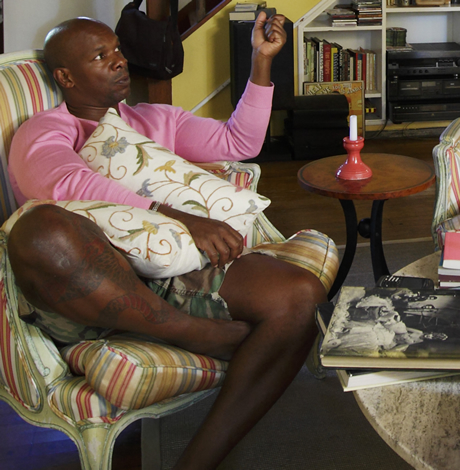
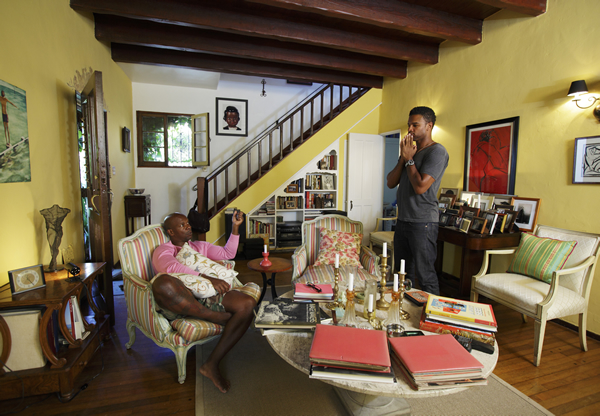
Doug Spearman, left, and Marc Samuel at their home. The photo is from ‘Tom Atwood: Kings & Queens in Their Castles,’ a new coffeetable book that shows LGBT people in their homes. (Photo used with permission from Atwood)
Does a 15-year project of photographing 350 LGBT subjects sound overly ambitious? Not for Tom Atwood, who has done just that with his breathtaking photo series, “Tom Atwood: Kings & Queens In Their Castles” (Damiani, March 28). Atwood’s monumental project, which has been named the most comprehensive LGBT photo series ever conducted in the U.S., portrays the intimate moments of prominent figures ranging from Don Lemon to Alison Bechdel.
If you’re a poetry fan, “New American Best Friend” by Olivia Gatwood (Button Poetry, March 28), is a stunning celebration of contemporary womanhood, gender and sexuality by one of the most venerated young poets and queer writers in America. Gatwood effortlessly segues between themes of pleasure, violence, youth and adulthood, and ultimately transitions into a fearless ode to women and the messy journey faced in finding oneself.
If you’re crafty and creative, “Queer Threads: Crafting Identity and Community” by John Chaich and Todd Oldham (AMMO Books, April 1), is a delightful compilation of crochet, embroidery, quilting and sewing masterpieces by an international mix of 30 LGBT artists. To elaborate on how queerness has influenced their fiber and textile work, the artists are interviewed by renowned leaders in creative fields — many gay themselves.
As we still grieve his sudden passing, “George Michael: the Life: 1963-2016” by Emily Herbert (Lesser Gods, April 4), will provide closure on the life and legacy of one of Pop’s most beloved and unapologetically gay icons. Herbert thoughtfully touches on George Michael’s early life, rise to fame, sex scandals, struggle with depression and addiction, and mysterious death, ultimately revealing that his legacy is as rooted in (often anonymous) charity as it is in music.
In “The Secrets of My Life” by Caitlyn Jenner (Grand Central Publishing, April 25), readers can dive much deeper into the remarkable story of the most famous transgender woman in the world, told in her own words. Jenner recounts intensely personal stories of her struggle to find self-acceptance in the context of being an Olympic legend and global symbol of masculinity, as well as the patriarch of the ubiquitous Kardashian family.
In “No One Can Pronounce My Name: A Novel” (Picador, May 2), Lambda Literary Award-winning author Rakesh Satyal tells the multigenerational story of a community of Indian Americans living in a Cleveland suburb. Harit, a lonely Indian immigrant in his 40s, finds himself dressing in a sari every night to pass off as his deceased sister for his grieving mother. He later befriends Ranjana, who writes paranormal stories to find escape during her husband’s suspected infidelity. Their unlikely friendship is a hilarious and touching account of navigating American society and the divide between Eastern and Western cultures.
After a generous profile in the New Yorker last year, “Nature Poem” by Tommy Pico (Tin House Books, May 9), is definitely one of this year’s most anticipated LGBT releases. In a book-length poem, Pico tells the story of Teebs, a young, queer, American-Indian poet who prefers city life and struggles to write about nature, the subject white people and wider American culture equate him with. Pico himself identifies as queer and grew up on the Viejas Reservation near San Diego, so “Nature Poem” is very much a meditation on his own life in Brooklyn and his American-Indian identity.
No matter your age, “It’s Not Like It’s A Secret” by Misa Sugiura (HarperTeen, May 9), is a young adult fiction novel about two girls of color falling in love that will touch even the least-high school nostalgic of readers. In this poignant coming-of-age story, 16-year old Sana moves to California, where she meets the beautiful and intelligent Jamie Ramirez. Jamie spurs Sana to finally spill some of her many secrets, the hardest to admit being that she wants to be more than friends with Jamie.
For more poetry, “How To Get Over” by T’ai Freedom Ford (Red Hen Press, May 9), is a spellbinding debut that fearlessly confronts the author’s past hardships, including those related to sexual identity, sexual assault and substance abuse. Ford grapples with themes of homophobia, bullying, anti-black racism and gentrification, incorporating important reminders of slavery’s legacy as well as directly addressing modern-day pop culture icons like Kanye West and Nicki Minaj.
“The Voice Book for Trans and Non-Binary People: A Practical Guide to Creating and Sustaining Authentic Voice and Communication” by Matthew Mills and Gillie Stoneham (Jessica Kingsley Publishers, May 18) is a comprehensive guide for trans and non-binary individuals interested in achieving a different voice that feels more authentic to their identities. Written by two language and specialist speech therapists, this book provides a thorough overview of the process to develop new vocal skills, and includes exercises on resonance, intonation and pitch.
In her much-anticipated second memoir, “Surpassing Certainty: What My Twenties Taught Me” (Atria Books, June 13), Janet Mock details the existential growing pains she faced during her early 20s, many of which will feel relatable to readers despite her status as one of the most revered transgender rights and racial justice activists of her generation. “Surpassing Uncertainty” candidly unfolds with Mock’s uncomfortable failures and incremental successes in love and intimacy, career development and learning to advocate for herself as a transgender woman of color before advocating for her wider community.
This year, we’re blessed with not one but two memoirs written by bisexual writer Roxane Gay. In “Hunger: A Memoir of (My) Body” (Harper, June 13), the much-buzzed-about author explores her struggles with food, weight and body image with restorative vulnerability and honesty. Through her own journey, Gay provides invaluable lessons on self-care and self-love.
Other releases of note include:
• “Marilyn in Manhattan: Her Year of Joy” by Elizabeth Winder (Flatiron Books) is a beautiful love letter to one of the most celebrated icons of all time, specifically profiling her time in the Big Apple from 1954-1955: a year of independence, success and relief for Monroe. The book is $27.99 and releases March 14. The author will present the book at East City Bookshop (645 Pennsylvania Ave., SE) on Wednesday, March 15 at 7:30 p.m.
• “The Rules Do Not Apply: A Memoir” by Ariel Levy (Random House) is a sardonic reflection on the famed New Yorker writer’s life, telling the story of her traumatic loss of her unborn child in Mongolia through her signature queer feminist lens. The memoir is $16 and releases March 14.
• “The Tree of Healing of Love Love & Missed Opportunity” by Rev. Steven R. Fleming is an allegorical and evocative journey through seven symbolic gates that takes readers from pain and anger to acceptance and new possibilities via colorful, lyrical prose. It’s out now. Details at healingtreeoflostlove.com.
• “The War on Sex” (March, Duke University Press) explores the history of sex offender registries, criminalization of HIV and laws against sex work in a series of essays edited by David M. Halperin and Trevor Hoppe.
• “The Lotterys Plus One” (March 28, Levine) is the latest from lesbian bestselling author Emma Donoghue, her “middle-grade debut” (i.e. for grade school readers), which tells of family life when a grandfather with dementia comes to live with a family with young children.
• “The Spartacus International Gay Guide 2017” (Bruno Gmuender) is a must-have for gay and bisexual men who love to travel abroad. This year’s edition ($24.99) is out April 1, just in time for summer travel planning.
• “Making My Pitch: A Woman’s Baseball Odyssey,” by Ila Jane Borders and Jean Hastings Ardell (University of Nebraska Press), is the autobiography of Ila Jane Borders, the first woman to play men’s professional baseball in the modern era and, at the time, was a closeted gay athlete. It is $26.95 and is out April 1.
• “When I Grow Up I Want to Be a List of Further Possibilities,” by Chen Chen (BOA Editions Ltd.), is the author’s debut collection of poems that investigate love, family and identity from queer, Asian-American and immigrant perspectives. It’s $16 ($9.99 e-book) and releases April 11.
• “LGBT: San Francisco: the Daniel Nicoletta Photographs” (Reel Art Press) is an arresting compilation of the legendary photographer’s images of gay 1970s San Francisco, which include iconic photographs of Harvey Milk. The book is $60 and releases May 23.
Books
Pioneering gay journalist takes on Trump 2.0 in new book
Nick Benton’s essays appeared in Fall Church News-Press
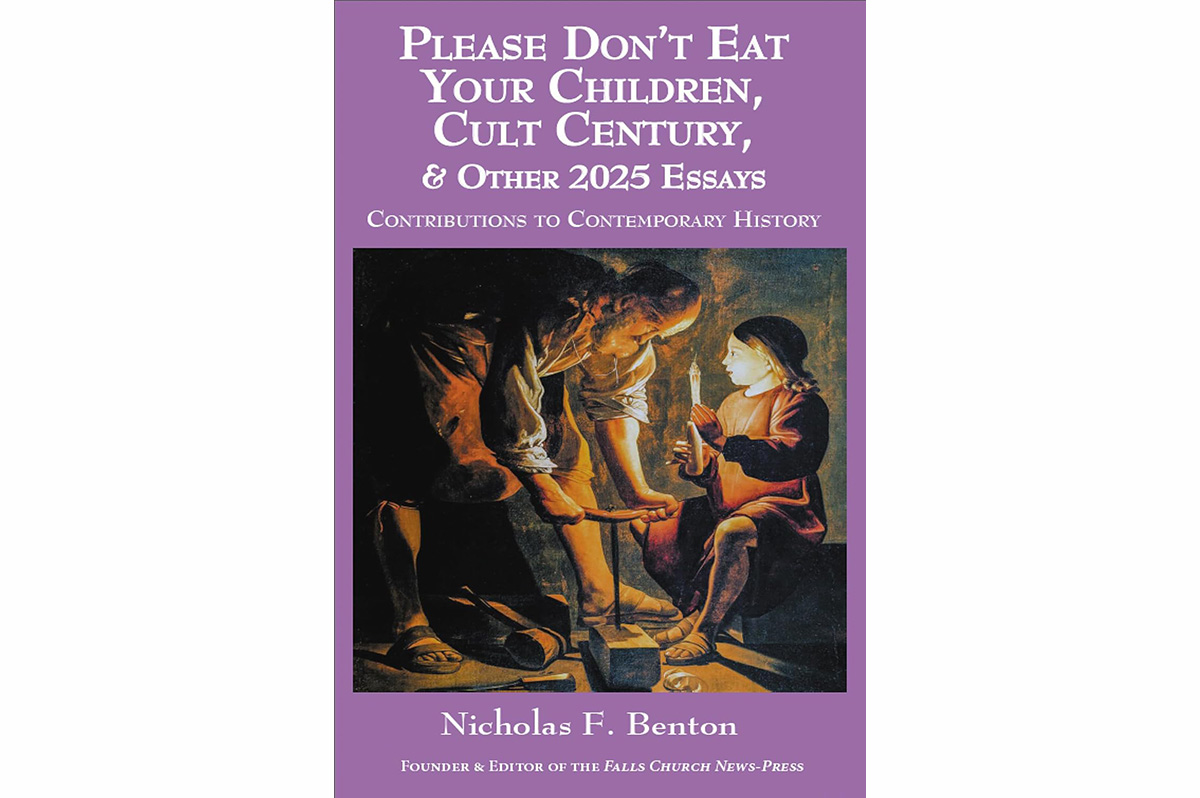
Nicholas Benton is a well-known local LGBTQ advocate and journalist and the longtime owner and editor of the Falls Church News-Press, a weekly newspaper.
In his eighth book out now, Benton offers a new set of remarkable essays all crafted in the first eight months of Trump 2.0 and its wholesale effort at dismantling democracy and the rule of law. Most were published in the Falls Church News-Press, but he adds a new piece to this volume, as an addendum to his “Cult Century” series, revealing for the first time his experiences from decades ago in the political cult of Lyndon LaRouche, aimed at providing a clearer grasp of today’s Cult of Trump.
His “Please Don’t Eat Your Children” set takes off from the satire of Jonathan Swift to explore society’s critical role of drumming creativity out of the young.

Below is an excerpt from “Please Don’t Eat Your Children, Cult Century, and other 2025 Essays.”
Please Don’t Eat Your Children
In his famous short essay, “A Modest Proposal: For Preventing the Children of Poor People in Ireland From Being a Burden to Their Parents or Country and for Making Them Beneficial to the Public,” author and Anglican priest Jonathan Swift (1667-1745) uses cutting satire to suggest that cannibalism of the young might help solve a battery of social ills.
As we examine our broken society today, it seems to me that reflecting on Swift’s social critique can be quite useful. Now we face a nation filled with anger and division and there is little to suggest any real solutions other than insisting people “don’t do that!” We can start out with the observation that young children, left to their own, are neither hateful nor cruel. How do they get that way later on in their lives? What drives them toward such emotional states and behaviors? It is not a problem only for the margins of society, for the extreme misfits or troubled. It is defining the very center of our culture today. Our divisions are not the cause, but the result of something, and nobody is saying what that is.
Swift doesn’t say what it is in his biting little essay. But it is implied by a context of a lack of bounty, or poverty, on the one hand, and an approach to it characterized by obscenely cruel indifference, on the other. He coined the phrase “useless eaters” in defining his radical solution. In Hitler’s Germany, that term resonated through the death camps and some in our present situation are daring to evoke it again as the current administration pushes radical cuts in Medicaid funding.
But while that refers to the old and infirm, mostly, it is the young we are talking about here. The problem is that our society is structured to devour our young and as they begin to find that out, they rebel. Not in all cases is this the practice, of course. Where there is little or no lack, things are different. We nurture our young, as we should, and we love them. Lucky is the child who is born to parents who are of means, and in a community where nurture is possible and valued. But even such children are ultimately not immune from facing a destiny of pale conformity battered by tightly delimited social expectations and debt slavery. If they have enough ambition, education and doors opened for them, some can run the gauntlet with relative effectiveness. Otherwise, our young are raised to die on battlefields, or to struggle in myriad other painful social conflicts aimed at advancing the world of their elders. In the Bible, there is a great admonition against this process that comes at the very precondition for the tradition it represents that begins with Abraham.
It is in the book of Genesis at the beginning of the Biblical story when, as that story goes, God commanded Abraham to kill his son, Isaac, as a sacrifice. As Abraham is about to obey, God steps in and says no. The entire subsequent eons-long struggle to realize Abraham’s commission by God to make a great nation that would be a light to the world would have been cut short right then if Abraham had slain his own son. The message is that all of the Abrahamic traditions, Judaism, Islam and Christianity, owe their source, and in fact are rooted, in God’s command to reject the sacrifice of children to the whims of their elders. The last thousands of years can be best defined in these terms, where nurture is pitted against exploitation of our young with, at best, vastly mixed results. Scenes like that at the opening of “All Quiet on the Western Front,” the World War I novel and film where a teacher rallies a classroom full of boys to enlist in the war, is bone chilling. Or, the lyric in Pink Floyd’s iconic song, Comfortably Numb, “When I was a child, I caught a fleeting glimpse out of the corner of my eye. I turned to look but it was gone. I cannot put my finger on it now. The child is grown, the dream is gone.”
Nick Benton’s new book is available now at Amazon.
The Blade may receive commissions from qualifying purchases made via this post.
Books
New book highlights long history of LGBTQ oppression
‘Queer Enlightenments’ a reminder that inequality is nothing new
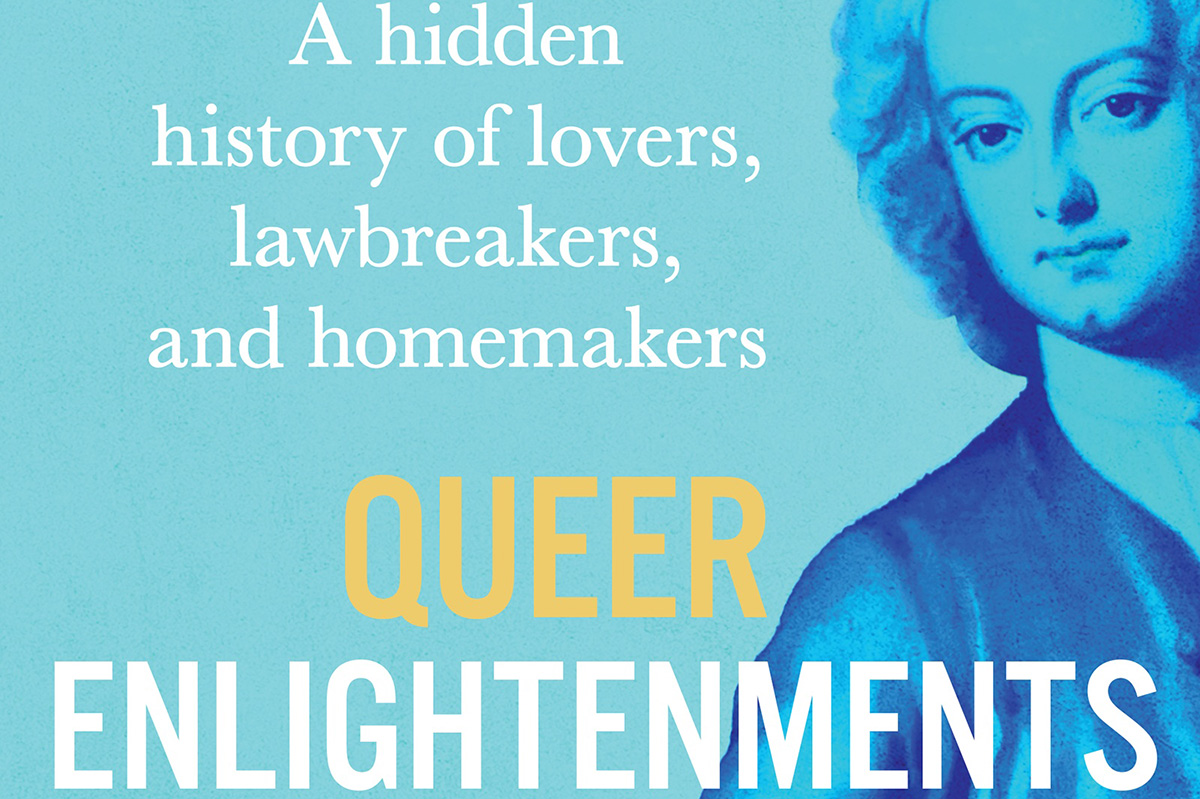
‘Queer Enlightenments: A Hidden History of Lovers, Lawbreakers, and Homemakers’
By Anthony Delaney
c.2025, Atlantic Monthly Press
$30/352 pages
It had to start somewhere.
The discrimination, the persecution, the inequality, it had a launching point. Can you put your finger on that date? Was it DADT, the 1950s scare, the Kinsey report? Certainly not Stonewall, or the Marriage Act, so where did it come from? In “Queer Enlightenments: A Hidden History of Lovers, Lawbreakers, and Homemakers” by Anthony Delaney, the story of queer oppression goes back so much farther.

The first recorded instance of the word “homosexual” arrived loudly in the spring of 1868: Hungarian journalist Károly Mária Kerthbeny wrote a letter to German activist Karl Heinrich Ulrichs referring to “same-sex-attracted men” with that new term. Many people believe that this was the “invention” of homosexuality, but Delaney begs to differ.
“Queer histories run much deeper than this…” he says.
Take, for instance, the delightfully named Mrs. Clap, who ran a “House” in London in which men often met other men for “marriage.” On a February night in 1726, Mrs. Clap’s House was raided and 40 men were taken to jail, where they were put in filthy, dank confines until the courts could get to them. One of the men was ultimately hanged for the crime of sodomy. Mrs. Clap was pilloried, and then disappeared from history.
William Pulteney had a duel with John, Lord Hervey, over insults flung at the latter man. The truth: Hervey was, in fact, openly a “sodomite.” He and his companion, Ste Fox had even set up a home together.
Adopting your lover was common in 18th century London, in order to make him a legal heir. In about 1769, rumors spread that the lovely female spy, the Chevalier d’Éon, was actually Charles d’Éon de Beaumont, a man who had been dressing in feminine attire for much longer than his espionage career. Anne Lister’s masculine demeanor often left her an “outcast.” And as George Wilson brought his bride to North American in 1821, he confessed to loving men, thus becoming North America’s first official “female husband.”
Sometimes, history can be quite dry. So can author Anthony Delaney’s wit. Together, though, they work well inside “Queer Enlightenments.”
Undoubtedly, you well know that inequality and persecution aren’t new things – which Delaney underscores here – and queer ancestors faced them head-on, just as people do today. The twist, in this often-chilling narrative, is that punishments levied on 18th- and 19th-century queer folk was harsher and Delaney doesn’t soften those accounts for readers. Read this book, and you’re platform-side at a hanging, in jail with an ally, at a duel with a complicated basis, embedded in a King’s court, and on a ship with a man whose new wife generously ignored his secret. Most of these tales are set in Great Britain and Europe, but North America features some, and Delaney wraps up thing nicely for today’s relevance.
While there’s some amusing side-eyeing in this book, “Queer Enlightenments” is a bit on the heavy side, so give yourself time with it. Pick it up, though, and you’ll love it til the end.
The Blade may receive commissions from qualifying purchases made via this post.
Books
A history of lesbian workarounds to build family
Fighting for the right to have and raise kids
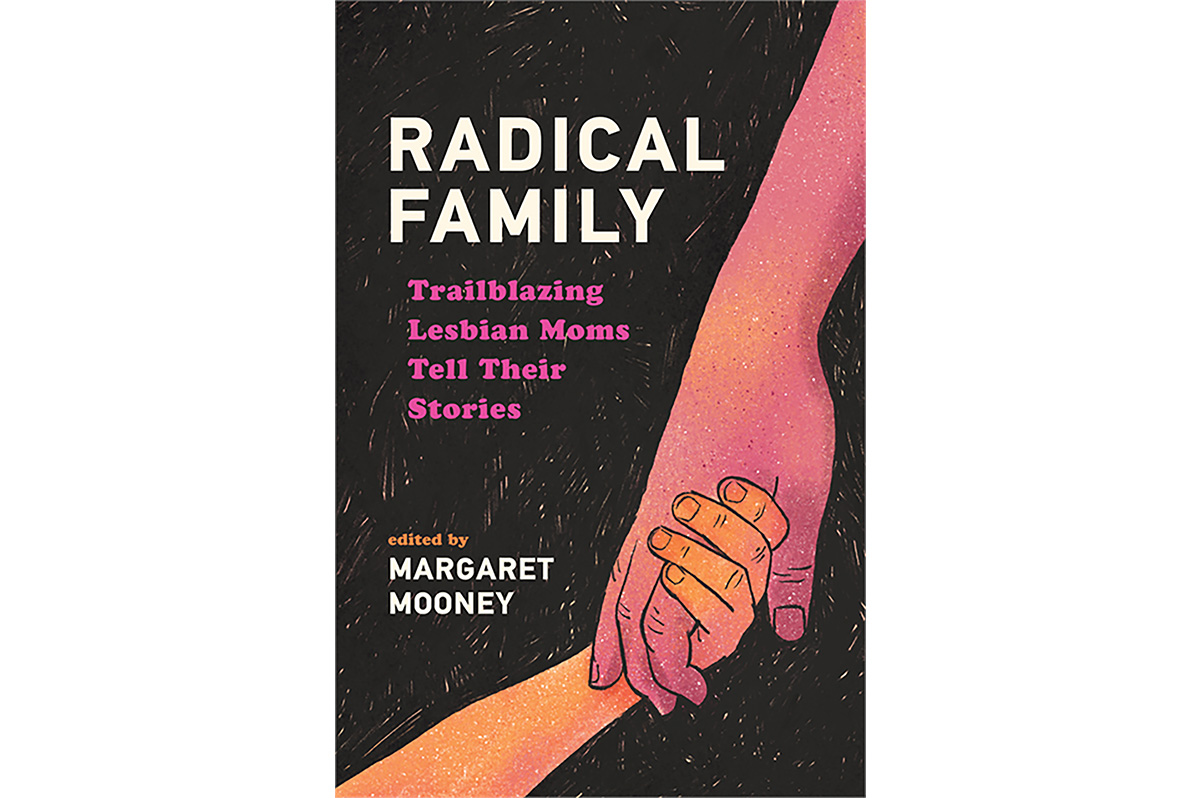
‘Radical Family: Trailblazing Lesbian Moms Tell Their Stories’
Edited by Margaret Mooney
c.2025, Wisconsin Historical Society Press
$20/150 pages
You don’t have a white picket fence with an adorable gate.
The other parts of the American Dream – the house in the suburbs, a minivan, and a big backyard – may also be beyond your reach. You’ve never wanted the joyous husband-wife union, but the two-point-five kids? Yeah, maybe that’s possible. As in the new book “Radical Family,” edited by Margaret Mooney, it’s surely more so than it was in the past.

Once upon a time, if a lesbian wanted to raise a family, she had two basic options: pregnancy or adoption. That is, says Mooney, if she was willing to buck a hetero-centric society that said the former was “selfish, unnatural and radical” and the latter was often just simply not possible or even legal.
Undaunted, and very much wanting kids, many lesbians ignored the rules. They built “chains” of women who handed off sperm from donor to doctor to potential mother. They demanded that fertility clinics allow single women as customers. They wrote pamphlets and publications aimed to help others become pregnant by themselves or with partners. They carefully sought lesbian-friendly obstetricians and nurses.
Over time, lesbians who wanted kids were “emboldened by the feminist movement and the gay and lesbian rights movement” and did what they had to do, omitted facts when needed, traveled abroad when they could, and found workarounds to build a family.
This book tells nine stories of everyday lesbians who succeeded.
Denise Matyka and Margaret McMurray went to Russia to adopt. Martha Dixon Popp and Alix Olson raised their family, in part and for awhile in conjunction with Popp’s husband. Gail Hirn learned from an agriculture publication how to inseminate herself. MC Reisdorf literally stood on her head to get pregnant. Mooney says that, like most lesbian parents then, she became a mother “without any safety nets…”
Such “struggles likely will feel familiar as you read about [the] desire to become parents…” says Mooney. “In short, these families are ordinary and extraordinary all at once.”
In her introduction, editor Margaret Mooney points out that the stories in this book generally take place in the latter part of the last century, but that their relevance is in the struggles that could happen tomorrow. There’s urgency in those words, absolutely, and they’re tinged with fear, but don’t let them keep you from “Radical Family.”
What you’ll see inside these nine tales is mostly happy, mostly triumphant – and mostly Wisconsin-centric, though the variety in dream-fulfillment is wide enough that the book is appropriate anywhere. The determination leaps out of the pages here, and the storytellers don’t hide their struggles, not with former partners, bureaucracy, or with roadblocks. Reading this book is like attending a conference and hearing attendees tell their tales. Bonus: photos and advice for any lesbian thinking of parenthood, single or partnered.
If you’re in search of positive stories from lesbian mothers and the wall-busting they did, or if you’ve lived the same tales, this slim book is a joy to read. For you, “Radical Family” may open some gates.
The Blade may receive commissions from qualifying purchases made via this post.
-

 The White House4 days ago
The White House4 days ago‘Lavender Scare 2.0’: inside the White House’s campaign against LGBTQ federal employees
-

 a&e features3 days ago
a&e features3 days agoMeet Mr. Christmas
-

 District of Columbia4 days ago
District of Columbia4 days agoActivists praise Mayor Bowser’s impact on city, LGBTQ community
-

 Japan5 days ago
Japan5 days agoTokyo court upholds Japan’s same-sex marriage ban




















